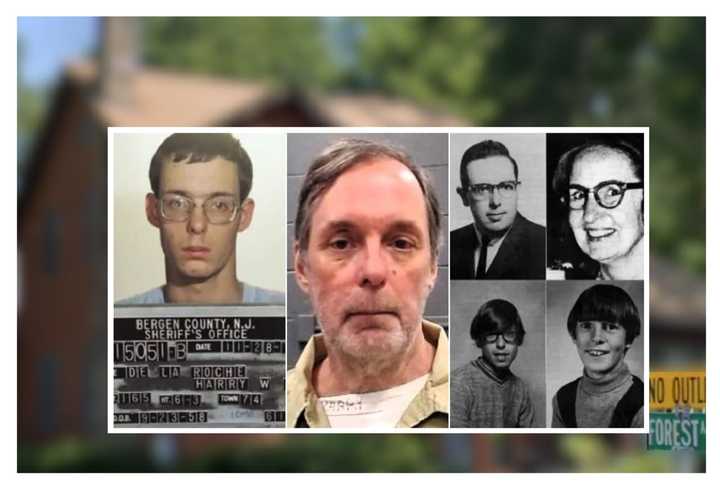Harry De La Roche, 64, had been denied six times and was told in 2019 that he'd have to wait until 2028 before he could petition the Parole Board again.
However, records show a variety of work, annual reviews and other credits combined to free De La Roche on June 29 after 45 years behind bars.
As with all state inmates, the 6-foot-3-inch, 219-pound De La Roche must first pull time at a halfway house while finding a steady job and observing curfew. State officials didn't provide a final release date.
De La Roche was an 18-year-old freshman at The Citadel military college in Charleston, South Carolina -- after graduating from Pascack Hills High School earlier that year -- when he came home to Montvale for the holidays in 1976.
Three days after Thanksgiving, De La Roche shot and killed his parents, Harry Sr. and Mary Jane, and his brothers Eric, 12, and Ronald, 15.
It was one of the most gruesome crimes in New Jersey history, with each parent shot twice in the head with a .22-caliber pistol that De La Roche told investigators he'd cleaned and loaded four days earlier. Eric was shot once in the head and chest and was bludgeoned.
Ronnie's body was found stuffed into a portable wardrobe in the attic hours later. He'd been shot once in the head.
De La Roche left the house around 4 a.m., ran a stop sign and was pulled over by a police officer at East Grand Avenue and Kinderkamack Road. Three members of his family had been murdered and the fourth was missing, he shouted to the officer as he emerged from his black and white Ford.
After that, the story kept changing.
De La Roche confessed at one point, saying that he'd been abused by an authoritarian father who disciplined him with beatings. He wanted to quit military school, he said, but the old man was having none of it.
Then things exploded.
De La Roche later said he was under duress when he confessed. The truth, he claimed, was that Ronnie was high on drugs and killed the others -- forcing him to kill Ronnie.
De La Roche eventually pleaded guilty by reason of insanity and even testified in his own defense.
Rejecting his arguments, jurors in Hackensack convicted De La Roche of four counts of first-degree murder in January 1978 following a trial that lasted nearly a month. He was sentenced to an equal number of consecutive life terms and assigned to South Woods State Prison in Bridgeton.
De La Roche went to court after being denied his freedom for a sixth time in 2018. His lawyer argued that the Parole Board was determined to keep his client behind bars “no matter what he says or does.”
The New Jersey Appeals Court refused to reverse the Parole Board’s September 2018 decision, however, saying it was “amply supported by the record and consistent with controlling law."
The judges noted that the three-member Parole Board's “comprehensive” decision detailed how De La Roche “lacked insight into his anti-social conduct, minimized his violent actions, and denied key aspects of the crimes.”
The Parole Board called him a “troubled individual” who continues denying responsibility for what he’d done.
The board cited "the flat emotionless tone in which [he was] able to describe the murders,” as well as De La Roche's “continuing denial” that he committed the killings and his consideration of himself as a victim.
He "appeared to lack discernable emotion or empathy" and his answers seemed “rote,” the Parole Board said in its decision.
The appeals court, in supporting that decision, cited how De La Roche had yet to "honestly assess [himself], the true nature of [his] violent actions and how realistically [he] will handle/address life experiences of a stressful/confrontational nature if re-released into society at this time.
“The Board's decision was not arbitrary, capricious, or unreasonable,” the appeals judges wrote. “De La Roche's primary argument to the contrary is without sufficient merit to warrant further discussion; his remaining arguments are without sufficient merit to warrant discussion in a written opinion.”
All that apparently changed in the five years since then.
Click here to follow Daily Voice Jersey City and receive free news updates.
